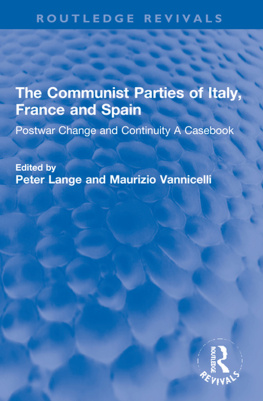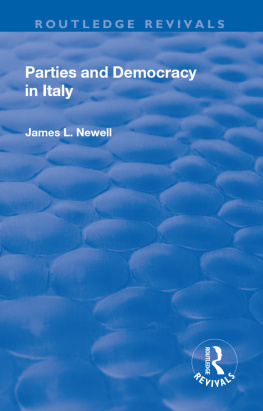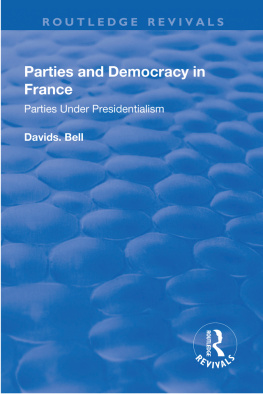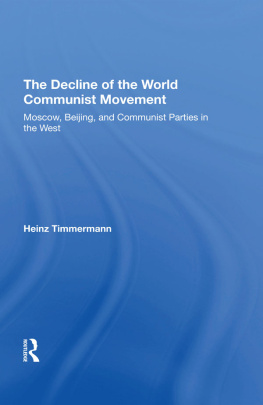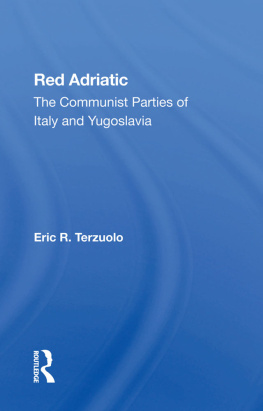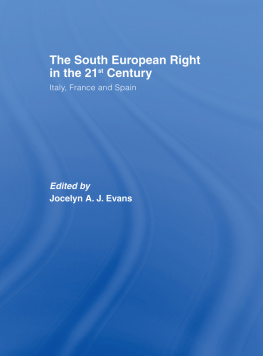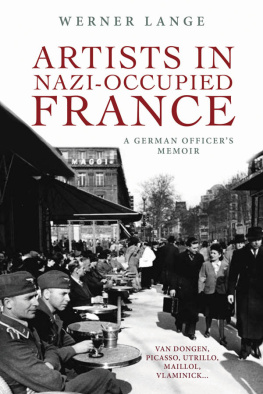Routledge Revivals
The Communist Parties of Italy, France and Spain
First published in 1981, The Communist Parties of Italy, France and Spain presents a comparative and integrative overview of the development of three Communist parties in the postwar Europe. Through the systematic presentation of the most important documents of the Communist parties, the book provides an access to the basic declarations and positions to illustrate the strategic and ideological evolution of these three parties in the advanced industrial democracies. Eurocommunism, the editors argue cannot be usefully understood as a phenomenon which suddenly appeared and equally as rapidly disappeared, in the 1970s. Rather it is a process of adaptation and change which characterizes the development of all three parties since World War II. The explicitly comparative organisation of the documents into five basic themes -general strategy, alliances, party organization, international policy, policy toward the communist movement, allows the reader both to follow any single party in a specific policy area or to compare the parties in response to major domestic or international events of significance. Rich in archival material, this book will be an invaluable resource to scholars and researchers of European Politics, comparative politics, comparative communism and modern European history.
The Communist Parties of Italy, France and Spain
Postwar Change and Continuity A Casebook
Edited by Peter Lange and Maurizio Vannicelli
First published in 1981
by George Allen & Unwin Ltd
This edition first published in 2021 by Routledge
2 Park Square, Milton Park, Abingdon, Oxon, OX14 4RN
and by Routledge
605 Third Avenue, New York, NY 10017
Routledge is an imprint of the Taylor & Francis Group, an informa business
Selection and Compilation, The President and Fellows of Harvard College, 1981; Editorial matter, Peter Lange and Maurizio Vannicelli, 1981; Foreword, Stanley Hoffmann, 1981.
All rights reserved. No part of this book may be reprinted or reproduced or utilised in any form or by any electronic, mechanical, or other means, now known or hereafter invented, including photocopying and recording, or in any information storage or retrieval system, without permission in writing from the publishers.
Publishers Note
The publisher has gone to great lengths to ensure the quality of this reprint but points out that some imperfections in the original copies may be apparent.
Disclaimer
The publisher has made every effort to trace copyright holders and welcomes correspondence from those they have been unable to contact.
A Library of Congress record exists under LCCN: 80041833
ISBN 13: 978-1-032-02888-0(hbk)
ISBN 13: 978-1-003-18566-6(ebk)
The Communist Parties of Italy, France and Spain: Postwar Change and Continuity
A Casebook
Edited by
PETER LANGE MAURIZIO VANNICELLI
Center for European Studies, Harvard University
With a Foreword by
STANLEY HOFFMANN,
Chairman of the Center for European Studies, Harvard University and Director of the Casebook Series on European Politics and Society
First published in 1981
This book is copyright under the Berne Convention. All rights are reserved. Apart from any fair dealing for the purpose of private study, research, criticism or review, as permitted under the Copyright Act, 1956, no part of this publication may be reproduced, stored in a retrieval system, or transmitted, in any form or by any means, electronic, electrical, chemical, mechanical, optical, photocopying, recording or otherwise, without the prior permission of the copyright owner. Enquiries should be sent to the publishers at the undermentioned address:
GEORGE ALLEN & UNWIN LTD
40 Museum Street, London WC1A 1LU
Selection and compilation, The President and Fellows of Harvard College, 1981; Editorial matter, Peter Lange and Maurizio Vannicelli, 1981; Foreword, Stanley Hoffmann, 1981.
British Library Cataloguing in Publication Data
The Communist parties of Italy, France and Spain. (Casebook series on European politics and society; vol. 1).
1. Communist parties Europe History
I. Lange, Peter II. Vannicelli, Maurizio III. Series
324.2407509JN94.A97980-41833
ISBN 0-04-329033-7
ISBN 0-04-329034-5 Pbk
Set in 10 on 11 point Plantin by Typesetters (Birmingham) Ltd
Contents
by Stanley Hoffmann
To Abbey
Students of European affairs and of communist movements may greet another volume on what is generally called eurocommunism with a mix of exasperation and incredulity. Has not enough been said already about a phenomenon that was treated far too seriously while it lasted, and that now deserves to be buried?
However, the mass of documents painstakingly selected by Messrs Lange and Vannicelli have a great and original merit: they allow the readers to judge for themselves rather than having to rely on the speculations and categorical opinions of innumerable commentators. And the subtle introductory essays written by Lange and Vannicelli constitute neither special pleading nor attempts at prophecy, they neither point with pleasure nor denounce with alarm. They put in historical and national perspective something that has never been a single movement, and even less a wave sweeping Western Europe (which it would be in Americas national interest either to break by building a barrage, or to greet by splashing happily in it). They are dealing, on the one hand, with a common problem: the situation of three major West European communist parties, linked to Moscow since the beginning of the Third International by ideological and institutional bonds, yet out of the government (which it is the objective of any revolutionary party to conquer, or at least to share), and operating within rapidly industrializing (some might say even post-industrializing) Western societies, in which the industrial proletariat has grown along lines far more complex than those forecast by Marxist dogma, in which the political systems, through various tribulations, have led not to single-party socialism but to varieties of representative and pluralist democracy, and which all belong to what the Soviet Union considers to be the American camp. But Lange and Vannicelli, on the other hand, are looking at a complex process: trying to define a communist way adapted to the specific realities of their country has been, for the three parties in question, anything but simple and clear; it has never taken them on a single straight road; they have followed separate, winding paths, which have converged at times and diverged at other moments. This is precisely why the term eurocommunism has always been misleading.
All that it should suggest is an attempt to find a road that is not necessarily and constantly that of Moscow either in the realm of ideology, or in that of policy, or in organization, or with respect to the issue of Moscows control of the apparatus. But even in so far as relations with Moscow are concerned, it is always necessary to ask three distinct questions. In which of these areas does the party try to assert its originality or autonomy? Since when, and for how long? And who initiated the quest (after all, Moscows control is not incompatible with the definition of separate national strategies) or, to put it somewhat differently, to what extent did Moscow incite, or merely accept, or actually oppose which search? Moreover, the partys relation to Moscow is not the only interesting problem. There is also the relationship of the party to the other national political forces, and to the national society: how radical a transformation of it does the party seek, with whom, at what price? And there is the relation of each of these parties to the other communist parties of Western Europe, and to the developing European Community.



